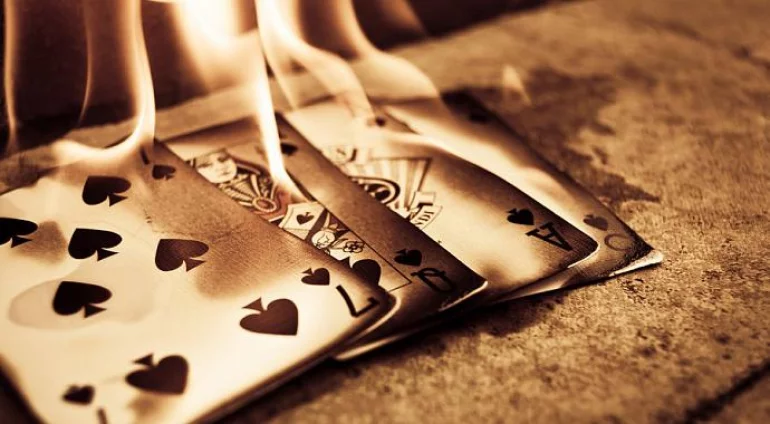_770.webp)
The temptation of gambling has existed throughout human history, but it has never covered millions of people as it is happening now, when almost everyone has an opportunity to gamble. We are playing government-sponsored lotteries, visiting land-based casinos all over the world, organizing junket tours, and finally, gambling on the Internet (not only on PCs but also on smartphones).
Moralists worry that the bulk of those who risk their money are people who can not afford to risk: the poor, the unemployed, and the low-paid workers. They believe that online gambling should be a pleasant pastime for those who can afford to lose a reasonable amount of money as payment for fun and safe adrenaline.
What is Gambling for Middle-class Players?
Gambling is a way for middle-class gamblers to go out who bet when their favorite teams have a match, occasionally buy lottery tickets, and visit casinos once or twice a year. For them, gambling is just an opportunity to have fun and get a little adrenaline, a brief moment of "brilliant" life in the routine of day-to-day hard work, career advancement, child education, and civic duties.
The fear of a potential victory, an opportunity to prove your ability to beat opponents and take the leading place, and a personal challenge that can increase your self-confidence if you win are factors that accompany gambling. To be sure, there are negative consequences, but they are insignificant for middle-class gamblers: for example, if they lose, their self-esteem decreases, and this applies not only to games but also to aspects of their real life.
Who Shouldn't Gamble?
There is also a category of gamblers who are addicted to the games of chance and can not afford to lose.
- They occupy the low-paid jobs.
- They lack education, skills, and entrepreneurial savvy.
- They can not ascend the social ladder with the help of their occupation.
- Therefore, they treat gambling as a chance to abandon their routine life, and the victory will lift them like a tsunami and make them millionaires at once.
After all, lottery tickets, slot machines, or roulette wheels do not have favorites. The poor, the homeless, and the unemployed compete with the rich and famous under equal conditions! So, they are "hooked" because gambling is their only chance to get everything they want from life.
When the successful businessman wins one million dollars, he gets a nice bonus: the opportunity to purchase a luxurious new car or other similar toys, expand his company, and relax on an around-the-world cruise again. So, he receives something without which he can normally live, and this does not particularly influence his life.

If a representative of the working class (janitor, gardener, security guard, cleaning lady) wins one million dollars, this event can radically change their way of life. It is an opportunity to buy a house or apartment, provide education for children, help the family, leave a hateful job, and finally live a real life. In other words, it becomes possible to change one's way of life radically.
The problem is that these changes are not stable. The occasional victory that brings a vast amount of money might rarely lead to reasonable investments in education, training, opening a business, or improving business opportunities. People just do not master rational planning and want to get the immediate satisfaction of their emotional needs as soon as possible, namel,y after winning miraculously.

Is it any wonder that many people who win the jackpot will become bankrupt in the next five years? They can hardly realize that this money can be used to move forward, change their habits, and improve their lifestyle. Over the short run, they get a spectacular chance to overcome a difficult time in life. Still, over the long run, such a victory becomes worse than the loss: the dream has come true, at least for a moment, and returning to the previous way of life becomes even more painful after becoming familiar with the taste of dolce vita.
The need to return to this dream, hoping that this time, it will be possible to win, makes people buy lottery tickets or make bets repeatedly. Gambling is prosperous, and the opportunity to make a dream come true seduces everyone.
Entertain or Gamble Reasonably?
Approximately $ 120 billion was spent worldwide on lottery tickets in 2014. Just think of it: one hundred twenty billion dollars was spent only on the lottery, not to mention dozens and hundreds of billions allocated to other gambling games!

Huge jackpots loom in front of gamblers like a carrot in front of a donkey's nose. The opportunity to get a big win overshadows the mind, and not many people can resist this temptation. Yet, Casinoz readers belong to those gamblers who want to understand all the intricacies of gambling and always look for pitfalls. So let's discuss the most dangerous features of gambling.
The Odds are Against Gamblers
Traditional games of chance and lotteries win only when a gambler loses. They continue to generate large amounts of profits for gambling establishments because a certain house edge is embedded in all of them, and the chances of casinos are always higher than the chances of gamblers.
Therefore, if you are going to gamble, do at least some research and determine which games offer you the best odds, and find out everything you can about the opportunity to improve your chances of success.
The Attitude of Gamblers Towards the Odds
Since your chances of winning in any game are lower than in casinos, a psychological trigger switches on in your brain that makes you look for an opportunity to increase your chances of winning. This desire to search for more and more chances to win is a natural human reaction to a victory/loss situation. Of course, it is necessary to win—at any cost! This is a real dependence on "victory."
Why do we use quotation marks for the word "victory"? - Well, because victory can be worse than the loss. For example, people can wager one thousand dollars to win one hundred (the Martingale strategy). After such a "victory," they will feel great because they have won something. They do not realize that they have actually lost money.

There is only one way to increase your chances of winning in traditional games. It is to spend more money. It is necessary to pay for each chance of winning in casino games. Therefore, before you start playing, you should at least study the casino games and find the ones that offer you the highest chances of winning in each bet. Get the best chances of winning while spending less money.
Lack of Knowledge
Perhaps many people know a common joke: "Gambling is a tax on stupidity." Gambling or the lottery is not "stupidity." It is just entertainment. However, it is entertainment for the rich, and for the poor and the uneducated, it can become a punishment.
If you do not get all the available information and find games that can provide the highest odds, you will likely throw money away instead of having fun. It can hardly be treated as entertainment if you lose! It is important to note that if you do not know what to do with your payout, it is very likely that you will eventually find yourself in a worse financial position than when you started playing.
- Make sure that you know everything about the games in which you have chosen to gamble.
- Evaluate your chances of winning the money prize.
- Besides, you need to control your budget and set a limit that you are ready to lose, in pursuit of a win.
What Should You Do with Your Winning to Become Bankrupt?
It has been reported that most winners of lotteries or other games of chance who have been lucky enough to hit the big jackpot become bankrupt within several years after the victory. Users can find a few stories below.

Callie Rogers
She had a dream of all teenagers, which came true: in 2003, when Kelly was 16 years old, she was lucky enough to win the lottery and obtain 2 million euros. Having access to money, Kelly lost her head. She dropped out of school, left her parents, and began to live a fun life.She spent her money at a rate of 20 thousand per day! So, her entire fortune was spent on parties, drugs, cosmetic and plastic surgery, celebrations, and gifts. Six years later, only the debt of one hundred thousand dollars remained from her $2 million fortune: the lady could not stop.
Evelyn Adams
Lady Luck smiled at this woman working as a clerk in a modest shop twice: she won the lottery and earned $3.9 million in October 1985, and four months later, she won another $1.4 million. What else did she need? Live and enjoy! But Evelyn believed in her luck and went to Atlantic City in 1986 to gamble for high stakes.
The outcome was obvious. Her $3 million fortune disappeared within three years, and Evelyn Adams became unemployed and lived in a trailer.

Michael Carroll
In November 2002, at the age of 19, unemployed Michael won the National Lottery and received $15.4 million. Then he began to spend it. At first, he gave away $4 million to friends and relatives. Then, he bought a house and a few racing cars.
Millions were spent on cocaine, alcohol, gambling, and prostitutes. For example, a year after his victory, he smoked crack for two thousand dollars per day and ordered a dozen whores per day. One million dollars was lost at the race track, and 2 million was spent on one single wager on his favorite football team, Rangers F.C.
He even became famous. British media called him "Lotto lout" and described the adventures of this remarkable character. Even a documentary film about this character, named Michael Carroll: King of Chavs, appeared on the screen.
Michael was in prison twice. In 2004, he spent five months in jail, and in February 2006, he was sentenced to a nine-month jail term for a fight.
As a result, Michael sold his mansion and luxury sports cars in 2008 to pay off his debts and became a binman, earning $5 an hour. He currently works in a biscuit factory for just 204 euros per week.
Andrew Jackson "Jack" Whittaker Jr.
Jack Whittaker won nearly $315 million in 2002, hitting the jackpot in the Powerball lottery. Andrew was 55 years old, and he was not poor. He was a co-owner of Diversified Enterprises Construction, living in a big house with his wife and grandchildren, and working in the company. In other words, he was living a simple American life. And then he suddenly won. Perhaps this is the most obvious illustration of what easy money can bring.

Initially, Jack generously donated millions to charity, including $14 million spent on creating his charitable organization called Jack Whittaker Foundation. On deciding that he had done enough good deeds, Jack plunged into dissipation: he spent his millions on alcohol, whores, and gambling. Andrew became addicted to horse racing and spent about three million dollars at the race track within one year. Later, his dream turned into a nightmare: a briefcase with $545,000 in cash was stolen from the car that he had left unlocked near the strip club.
In 2004, this story repeated. About $200,000 in cash was stolen from the same Jack's car near the same strip club. A friend of his granddaughter was found dead in Whittaker's home in 2004. The cause of death was a drug overdose.
Three months later, his granddaughter died due to the exact cause. It turned out that Andrew was the one to blame for their death: every week, he gave $2,100 to her granddaughter, and she became addicted to heroin together with her boyfriend. In the same year, the girl's mother - Andrew's daughter - died.
Within two years, Jack was arrested twice for drunken driving and a drunken brawl. In January 2007, Whittaker claimed thieves took all his money from his bank accounts. After five years, all his millions turned to dust. Andrew Whittaker had neither a family nor a job. He lost all his money.
These are very depressing statistics. What will you do if you are lucky enough to win a couple of million? Is everything so hopeless?
_770.webp)
The 10-20-70 Plan
It turns out that everything is not so bad. There is an opportunity to kill two birds with one stone. It is a 10-20-70 model. The most interesting thing about this model is the fact that it can be used for both your winnings and any other amounts that you can get. This is a standard system that is used by wealthy people to protect their financial future, so you should also enjoy it. You can try to practice on your salary, and after the victory, you will know what to do.
So, let's discuss the 10-20-70 model. What is the meaning of these numbers?
Give 10% to Charity
Before spending the money, you should allocate 10% of your winnings to charity. Maybe you think giving your money away without any reason is stupid. But everything is more complex. It has its profound sense. You can donate money as gratitude. You can consider it to be a price to pay for your success. Finally, charity is a way of donating to the society in which you grew up.
In fact, you should learn how to do it from an early age, but it is never too late to start. Visit places where people are helpless and try to feel compassion for them. As soon as you understand and feel the misery of these people, you will have problems giving away a small part of your money.

You should start practicing the "10% charity" rule with any additional income because it is easy to do this with small amounts. It is pretty easy to give one-tenth of one thousand. However, giving ten thousand out of one hundred thousand is much more challenging.
You may say, "Oh, if I had one hundred thousand dollars, I would easily give ten thousand away." But this is not true, ten thousand dollars is a huge sum of money, and it is much more difficult to give it away. Start practicing with small amount,s and you can develop the habit before you will be able to earn big money.
Invest 20%
With the help of the other 20%, you should try to create wealth. How to do it? Well, there are many ways in which you can invest money profitably. Imagine what you want, evaluate your skills, recall your hobbies, and consider ways to convert this into a profitable business. Maybe you're a programmer, and you can create your online store. Or are you a builder, and you can purchase some property, improve it, and resell it? Or you are a financier and you know how to invest in stocks and make a profit.

Poor people spend their money and save what's left, while rich people invest their money and spend what's left.
Spent 70% on Lifestyle
When thinking of ways to spend 70% of the amount, you must divide it between needs and non-essential items. First, you should get rid of all debts, pay off all the loans, and purchase a flat or a house. Be practical. You can do something for your pleasure once you've met your needs. Make yourself happy. Do something that you've always dreamt of but could not afford.

There is a psychological reason for such an approach. Think of it. When you win money, you start thinking, "Ooooh! Now I can do this and this, buy this and that!" This is a typical reaction. However, what awaits you when you give money to charity, invest it partly, pay the bills, and make other necessary expenses? The euphoria of winning will disappear, and you may notice that the available amount is much less than you used to think. And you will start spending money reasonably without wasting it.
In general, it is your right to decide whether to follow the crowd and join the majority after the victory, by completely becoming bankrupt or getting in debt. Alternatively, you can protect your future, avoid financial collapse, and begin to live better.
It is up to you to decide.
























